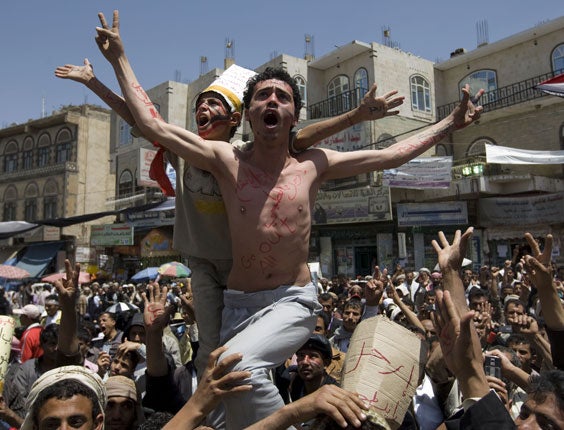Yemen's embattled President was hit by a wave of defections among his generals yesterday as tanks from rival factions took to the streets of the capital in a setback to his attempts to stay in power.
The regime vowed to counter any attempts at a coup after the country's top military commander switched sides and joined the protesters calling for end to the 32-year rule of Ali Saleh.
President Saleh appeared increasingly isolated after some ambassadors, religious and tribal leaders and sections of the military all turned on him. The military defections put more than 50 per cent of the military on the side of the rebellion.
Anti-government protesters based at Sana'a University were ecstatic to hear of the general's defection. Soldiers moved freely in and out of the protest camp, drinking tea, posing for photographs and receiving kisses from demonstrators who have camped there for more than a month demanding a change in regime.
The defections appeared to be in response to the regime's decision to use increased violence to fight protests against President Saleh's rule. Rooftop-based snipers loyal to the regime killed 52 protesters on Friday, prompting the President to sack his cabinet and declare a state of emergency.
The top commander, Major General Ali Muhsin al-Ahmar, a former close ally of the President, yesterday condemned the Saleh regime and declared his support for the revolution on behalf of the military. "Repressing peaceful demonstrators in public areas around the country has led to a cycle of crises which is getting more complicated each day and pushing the country toward s civil war," he said.
The general's forces on Sunday took up positions around a protest camp at Sana'a University. Once in position, he declared that his men would now protect the anti-government protesters from further attack. The general also sent tanks to the central bank and other strategic centres.
Following the defection, the Defence Minister, Mohammad Nasser Ali, claimed that the army still backed the President. "We will not allow an attempt at a coup against democracy and constitutional legitimacy, or violation of the security of the nation and citizens," he said.
An elite military force of Republican Guards led by the President's son and one-time heir apparent deployed tanks and armoured vehicles outside the presidential palace.
However, many feel that General Ali Muhsin's defection means the end of the Saleh regime. "There is a 60 per cent chance that this will become a bloodless coup," said one Yemeni government official.
Protesters were jubilant. "The army is with us. Praise God," said one, speaking on a stage at the university camp.
One soldier loyal to General Ali Muhsin guarding the protest camp wore a sash over his uniform that read: "For a better democratic society." Another rallied thousands of protesters, chanting: "Long live Yemen and long live the people's revolution."
Muhammad Qa'id, a 32-year-old unemployed teacher, said: "We welcome Ali Muhsin and his men to the revolution. They are not joining us as the army but simply as Yemenis joining hands with their brothers in revolution."
The defection forced a hasty reappraisal of General Ali Muhsin's role. The general's portrait had hung alongside photos and cartoons of President Saleh and other ruling party officials on the side of a tent and labelled: "criminals". Protesters yesterday scrambled to remove his picture from the line-up.
"If he wants to play a major part in a new Yemen, he can," said Adel al-Sarabi, one of the student organisers of the Sana'a University sit in.
The French Foreign Minister, Alain Juppé, yesterday became the first Western leader to call publicly for the President to stand down.
"We say this to Yemen, where the situation is worsening. We estimate today that the departure of President Saleh is unavoidable," he said.
David Cameron told Parliament yesterday that he was "extremely disturbed" by what was happening in Yemen. Western countries are concerned about the unrest in Yemen given the absence of a clear alternative leader and their view of the President as a bulwark against al-Qa'ida in the Arabian peninsula.

Join our commenting forum
Join thought-provoking conversations, follow other Independent readers and see their replies
Comments